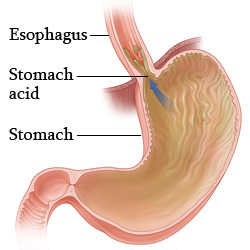Gastroesophageal Reflux in Children: Care Instructions
Overview

Gastroesophageal reflux is a backflow (reflux or regurgitation) of food and stomach acid into the esophagus.
This is the tube that connects the throat to the stomach. When reflux irritates the lining of the esophagus
and causes burning pain, difficulty eating, weight loss, or other problems, it is called gastroesophageal
reflux disease (GERD).
Most babies have reflux. Babies with reflux may spit up. And some healthy babies may spit up frequently.
Babies who have GERD may cry, vomit, and act fussy. Reflux usually goes away by the end of a baby's first
year.
Older children can have symptoms that are a lot like the ones adults get. They can have heartburn or
regurgitation.
Sometimes GERD causes breathing problems and other problems like a hoarse voice.
Follow-up care is a key part of your child's treatment and safety. Be sure to make and go to all
appointments, and call your doctor if your child is having problems. It's also a good idea to know your
child's test results and keep a list of the medicines your child takes.
How can you care for your child at home?
Infants
Older children
-
If your child is older than 12 months, raise the head of their bed a little bit. To do this, put blocks
under the frame. Or you can put a foam wedge under the head of the mattress. Using extra pillows does not
work.
-
Change your child's eating habits:
-
Try feeding your child smaller meals, more often.
-
Avoid foods that make your child's symptoms worse. These may include chocolate, mint, alcohol, pepper,
spicy foods, high-fat foods, or drinks with caffeine in them, such as tea, coffee, colas, or energy
drinks. If your child's symptoms are worse after eating a certain food, your child may want to stop
eating it to see if their symptoms get better.
-
Try to feed your child at least 2 to 3 hours before bedtime. This helps lower the amount of acid in
the stomach when your child lies down. Snacking close to bedtime can make their symptoms worse.
-
Be safe with medicines. Have your child take medicines exactly as prescribed. Call your doctor if you
think your child is having a problem with a medicine.
-
Talk to your doctor if you want to try over-the-counter medicines. Some are not used in younger children,
and some have aspirin in them. Do not give aspirin to anyone younger than 20. It has been linked to Reye
syndrome, a serious illness.
When should you call for help?
 Call 911
anytime you think your child may need emergency care. For example, call if:
Call 911
anytime you think your child may need emergency care. For example, call if:
Call your doctor now or seek immediate medical care if:
Watch closely for changes in your child's health, and be sure to contact your doctor if:
Current as of: October 19, 2023
Content Version: 14.0
Care instructions adapted under license by your
healthcare professional. If you have questions about a medical condition or this instruction, always ask
your healthcare professional. Healthwise, Incorporated disclaims any warranty or liability for your use of
this information.